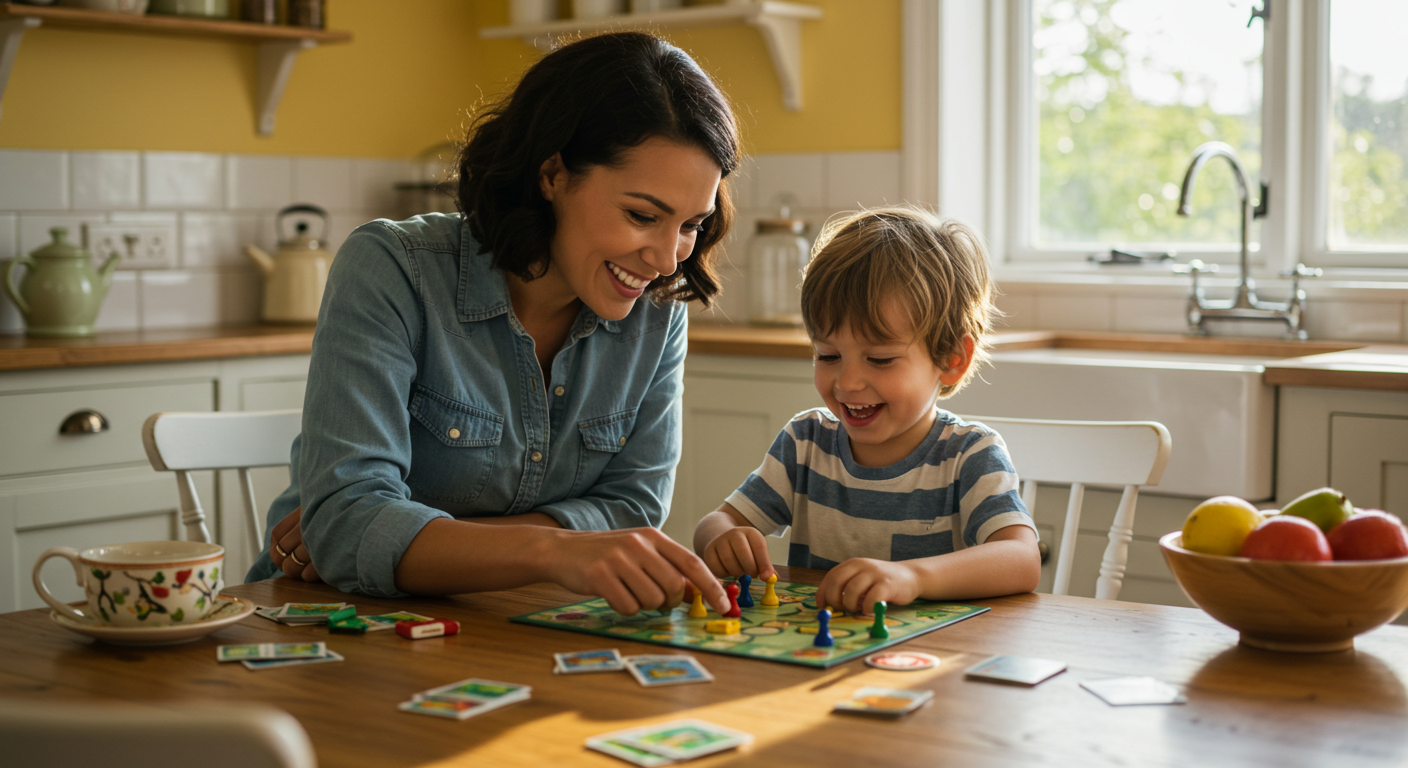Social Skills: Becoming a Positive Parent
“Positive parents.” Who are they, really? What does it take to become one? If you’re a parent eager to raise emotionally healthy, resilient children—this is a must-read. Today’s children and teens face pressure from so many angles: school, friendships, social media, and even their own internal battles. It’s completely normal for them to feel stressed, anxious, or overwhelmed at times. The challenge is not in eliminating those feelings—but in teaching them how to manage them. That’s where you come in. As a parent, your presence, attitude, and support can either build a bridge to emotional stability—or unintentionally create more confusion. Every child will go through seasons of difficulty. But if you’re equipped with positive parenting strategies, you can help your child navigate those seasons with grace and growth. And no, it’s not about being perfect. It’s about being present, kind, and intentional. Let’s explore what it really means to be a “positive parent” and how you can become a source of strength for your child, no matter what stage of life they’re in.

What Is Positive Parenting, Really?
“Positive parenting” is a parenting style that emphasizes encouragement, communication, and emotional support rather than punishment and criticism. The term was popularized by psychologist Alfred Adler, who believed that children thrive in environments where they feel heard, respected, and empowered. In such homes, discipline isn’t about control—it’s about connection. A positive parent is someone who guides rather than commands, listens more than lectures, and corrects behavior through calm, respectful communication. Rather than focusing on what the child does wrong, positive parenting pays attention to what they do right and how to help them do better. This doesn’t mean letting kids do whatever they want. It means setting boundaries with love and helping children understand consequences in a safe, supportive way. This method has been shown to reduce behavioral issues, increase emotional intelligence, and create stronger bonds between parents and children. In a world where children are constantly judged or pressured to perform, home should be the one place where they feel safe to be vulnerable. When parents focus on the long-term emotional development of their child—not just short-term obedience—they raise confident, compassionate, and resilient young people.

1. Show Them Unconditional Love
One of the most powerful things you can do for your child is show them that your love is not based on their performance. They need to know that they are loved simply because they exist—not because they got good grades or behaved perfectly. Unconditional love builds emotional security. It tells your child, “You are safe with me, even when you mess up.” Let them know, with your words and actions, that your love won’t vanish when they fail or disappoint. If your child makes a bad decision, treat it as a teaching moment, not a reason to shame. Talk openly about mistakes. Encourage them to reflect on what went wrong and how they can make a better choice next time. But always, always end that conversation with a reminder of your love. Scolding constantly or yelling during every mistake can damage their self-esteem and make them fear honesty. Especially during the teenage years, kids need the reassurance that home is their emotional anchor. When children feel safe emotionally, they are more likely to come to you with their struggles rather than hiding them.

2. Spend Intentional Time Together Every Day
Life is busy, but if there’s one investment that always pays off—it’s time. Make it a habit to spend at least 15–30 minutes a day connecting with your child in a way that matters to them. That could mean playing a game, helping them with homework, going for a walk, cooking a meal together, or simply talking about their day. The goal is not to force deep conversations, but to create space where they feel seen and heard. When a child knows they have their parent’s attention, it boosts their self-worth and emotional stability. These moments build trust and connection, and they can also become the safe place your child runs to when life gets hard. Teens in particular might seem like they don’t want your presence—but often, they just don’t know how to ask for it. Being consistently available creates a quiet sense of security. Remember, your presence speaks louder than any lecture. The little moments add up—and often become the memories your child treasures the most.

3. Teach Healthy Coping Skills
Children and teens are still learning how to deal with their emotions. If they don’t get the right tools early on, they may resort to unhealthy outlets later—like aggression, withdrawal, or self-doubt. As a parent, you can teach your child to name their feelings, express them in words, and work through them with grace. If they’re sad after a tough day at school, don’t rush to “fix” it. Instead, ask, “Do you want to talk about it?” Help them label their feelings: frustration, embarrassment, disappointment. Validate those feelings—tell them it’s okay to feel that way. Then, model how to respond: deep breathing, journaling, taking a walk, or simply asking for help. Teaching kids that emotions aren’t wrong—they’re just signals—helps them avoid bottling things up. With time, this builds emotional intelligence and resilience. Let them see you cope too. If you’ve had a hard day, say something like, “I’m feeling overwhelmed, so I’m going to take five minutes to breathe and reset.” This teaches them that emotional regulation is not just possible—it’s normal.
I
4. Encourage Good Habits for a Happy Mind
Mental health doesn’t exist in isolation from physical habits. Kids who sleep poorly, eat junk food regularly, and rarely move their bodies are at higher risk for emotional instability. Help your child build a lifestyle that supports both their physical and mental well-being. Encourage regular bedtimes, balanced meals, daily movement, and mindful moments. Mindfulness can be as simple as sitting still, praying together, listening to music, or saying what they’re thankful for each day. Gratitude, especially, has been proven to boost mood and reduce anxiety. Invite them to make a gratitude list or start a “three good things” bedtime habit. Help them unplug from screens at least an hour before sleep. Go outside for walks. Listen to music together. When children grow up in a home that values rest, movement, and gratitude, they internalize those rhythms. And these rhythms become their go-to tools for dealing with stress and overwhelm as they grow.

5. Boost Their Self-Esteem Gently
Confidence doesn’t come from endless praise. It comes from being encouraged through effort, not just outcomes. Positive parents build self-esteem by focusing on a child’s progress, persistence, and problem-solving. Instead of saying, “You’re so smart,” say, “I’m proud of how hard you worked on that.” Let them try age-appropriate tasks independently—even if they struggle. Letting them figure things out gives them a sense of competence. Teach them that failure is part of growth. Praise them for trying again. Your belief in them becomes the inner voice they carry throughout life. Be mindful of how you speak about your child in front of others. Avoid labels like “lazy” or “difficult.” Speak life over them—even when correcting behavior. Let them know that who they are is separate from what they do. When a child knows they are deeply valued for who they are, not just what they achieve, they grow into secure and confident adults.

Positive Parenting vs. Negative Parenting
The contrast between positive and negative parenting couldn’t be more striking. Positive parenting is rooted in connection, while negative parenting often relies on control. When parents are overly critical, emotionally distant, or use fear as a discipline tool, children internalize rejection. Over time, this can lead to anxiety, depression, low self-worth, and emotional withdrawal. Studies show that teens raised in harsh or overly strict environments are more likely to rebel—or worse, suffer in silence. On the other hand, teens raised with warmth and firm-but-kind guidance tend to be more emotionally balanced, confident, and resilient. That doesn’t mean there are no rules—positive parenting includes boundaries, but they’re enforced with empathy. It’s not about letting your child “get away with everything”—it’s about guiding them with dignity. If you were raised with negative parenting, it’s never too late to break the cycle. Your willingness to change—for your child’s sake—is powerful. Parenting is not about perfection. It’s about presence, patience, and progress.

The Takeaway: Is Positive Parenting for You?
The truth is, every child needs the same thing—love, guidance, and consistency. Positive parenting offers a path toward all three. It’s not always the easiest route, but it is one of the most rewarding. When your child feels safe, heard, and respected at home, they build the strength to face challenges outside of it. You don’t have to be perfect. You just need to be willing—to learn, to listen, and to love with intention. Whether your child is a toddler or a teenager, they need your presence more than your perfection. Positive parenting isn’t about raising flawless kids. It’s about raising humans who know how to love, fail, try again, and grow. So ask yourself: Is this the kind of parent I want to be? If the answer is yes, take the first small step today. Because your choice to parent with love and light might be the very thing that helps your child become who they were born to be.


